Home
About
Blog
Contact Us
Log In
Sign Up
Follow Us
Our Apps
Home>Words that start with R>research
How to Say Research in Different LanguagesAdvertisement
Categories:
General
Please find below many ways to say research in different languages. This is the translation of the word «research» to over 100 other languages.
Saying research in European Languages
Saying research in Asian Languages
Saying research in Middle-Eastern Languages
Saying research in African Languages
Saying research in Austronesian Languages
Saying research in Other Foreign Languages
abcdefghijklmnopqrstuvwxyz
Saying Research in European Languages
| Language | Ways to say research | |
|---|---|---|
| Albanian | hulumtim | Edit |
| Basque | ikerketa | Edit |
| Belarusian | даследаванне | Edit |
| Bosnian | istraživanje | Edit |
| Bulgarian | изследване | Edit |
| Catalan | recerca | Edit |
| Corsican | ricerca | Edit |
| Croatian | istraživanje | Edit |
| Czech | výzkum | Edit |
| Danish | forskning | Edit |
| Dutch | Onderzoek | Edit |
| Estonian | uurimistöö | Edit |
| Finnish | tutkimus | Edit |
| French | recherche | Edit |
| Frisian | ûndersyk | Edit |
| Galician | busca | Edit |
| German | Forschung | Edit |
| Greek | έρευνα [érevna] |
Edit |
| Hungarian | kutatás | Edit |
| Icelandic | Rannsóknir | Edit |
| Irish | taighde | Edit |
| Italian | ricerca | Edit |
| Latvian | pētniecība | Edit |
| Lithuanian | tyrimas | Edit |
| Luxembourgish | Fuerschung | Edit |
| Macedonian | истражување | Edit |
| Maltese | riċerka | Edit |
| Norwegian | forskning | Edit |
| Polish | Badania | Edit |
| Portuguese | pesquisa | Edit |
| Romanian | cercetare | Edit |
| Russian | исследование [issledovaniye] |
Edit |
| Scots Gaelic | rannsachadh | Edit |
| Serbian | истраживање [istrazhivanje] |
Edit |
| Slovak | výskum | Edit |
| Slovenian | raziskave | Edit |
| Spanish | investigación | Edit |
| Swedish | forskning | Edit |
| Tatar | тикшеренүләр | Edit |
| Ukrainian | дослідження [doslidzhennya] |
Edit |
| Welsh | ymchwil | Edit |
| Yiddish | פאָרשונג | Edit |
Saying Research in Asian Languages
| Language | Ways to say research | |
|---|---|---|
| Armenian | հետազոտություն | Edit |
| Azerbaijani | tədqiqat | Edit |
| Bengali | গবেষণা | Edit |
| Chinese Simplified | 研究 [yánjiū] |
Edit |
| Chinese Traditional | 研究 [yánjiū] |
Edit |
| Georgian | კვლევა | Edit |
| Gujarati | સંશોધન | Edit |
| Hindi | अनुसंधान | Edit |
| Hmong | kev tshawb fawb | Edit |
| Japanese | 研究 | Edit |
| Kannada | ಸಂಶೋಧನೆ | Edit |
| Kazakh | зерттеу | Edit |
| Khmer | ការស្រាវជ្រាវ | Edit |
| Korean | 연구 [yeongu] |
Edit |
| Kyrgyz | изилдөө | Edit |
| Lao | ຄົ້ນຄ້ວາ | Edit |
| Malayalam | ഗവേഷണം | Edit |
| Marathi | संशोधन | Edit |
| Mongolian | судалгаа | Edit |
| Myanmar (Burmese) | သုတေသန | Edit |
| Nepali | अनुसन्धान | Edit |
| Odia | ଅନୁସନ୍ଧାନ | | Edit |
| Pashto | څيړنه | Edit |
| Punjabi | ਖੋਜ | Edit |
| Sindhi | تحقيق | Edit |
| Sinhala | පර්යේෂණ | Edit |
| Tajik | тадқиқот | Edit |
| Tamil | ஆராய்ச்சி | Edit |
| Telugu | పరిశోధన | Edit |
| Thai | การวิจัย | Edit |
| Turkish | Araştırma | Edit |
| Turkmen | gözleg | Edit |
| Urdu | تحقیق | Edit |
| Uyghur | research | Edit |
| Uzbek | tadqiqot | Edit |
| Vietnamese | nghiên cứu | Edit |
Too many ads and languages?
Sign up to remove ads and customize your list of languages
Sign Up
Saying Research in Middle-Eastern Languages
| Language | Ways to say research | |
|---|---|---|
| Arabic | ابحاث [‘abhath] |
Edit |
| Hebrew | מחקר | Edit |
| Kurdish (Kurmanji) | lêkolîn | Edit |
| Persian | پژوهش | Edit |
Saying Research in African Languages
| Language | Ways to say research | |
|---|---|---|
| Afrikaans | navorsing | Edit |
| Amharic | ምርምር | Edit |
| Chichewa | kafukufuku | Edit |
| Hausa | bincike | Edit |
| Igbo | research | Edit |
| Kinyarwanda | ubushakashatsi | Edit |
| Sesotho | ho etsa lipatlisiso | Edit |
| Shona | tsvakurudzo | Edit |
| Somali | cilmi | Edit |
| Swahili | utafiti | Edit |
| Xhosa | uphando | Edit |
| Yoruba | iwadi | Edit |
| Zulu | ucwaningo | Edit |
Saying Research in Austronesian Languages
| Language | Ways to say research | |
|---|---|---|
| Cebuano | research | Edit |
| Filipino | pananaliksik | Edit |
| Hawaiian | ʻimi noiʻi | Edit |
| Indonesian | penelitian | Edit |
| Javanese | riset | Edit |
| Malagasy | fikarohana | Edit |
| Malay | penyelidikan | Edit |
| Maori | rangahau | Edit |
| Samoan | suʻesuʻega | Edit |
| Sundanese | panilitian | Edit |
Saying Research in Other Foreign Languages
| Language | Ways to say research | |
|---|---|---|
| Esperanto | esploro | Edit |
| Haitian Creole | rechèch | Edit |
| Latin | investigationem | Edit |
Dictionary Entries near research
- rescind
- rescue
- rescuer
- research
- research and development
- research institute
- research paper
Cite this Entry
«Research in Different Languages.» In Different Languages, https://www.indifferentlanguages.com/words/research. Accessed 14 Apr 2023.
Copy
Copied
Browse Words Alphabetically

Our languages are incredibly diverse and it is highly unlikely to find a word or a handful of words that sound the same in all languages. Except that there is a word that is shared by all human languages, according to research. Surprise, surprise..the word is ‘huh’. Weird, huh! Well, it turns out that this is probably a universal word.
Let’s explain first how this word works in more detail. Consider the following made-up conversation:
A: We decided to move to New York.
B: Where?
A: To New York.
Speaker A makes a statement, and Speaker B follows up on that by asking the question “Where?” which targets only a portion of the original statement, i.e., it is possible to infer that Speaker B had no trouble comprehending the message that they decided to move somewhere, but s/he presumably missed the final word. So, s/he requested a repetition of this information by asking “where?” and Speaker A supplied this information in his/her next turn. And this is what is termed by conversation analysts as repair.
But, what if, for some reason (i.g. extreme background noise), speaker B failed to comprehend the whole statement and wanted to request the repetition of the whole statement? How do you think the dialogue would have unfolded in this case? That’s where the word huh comes in. Take the following dialogue:
A: We decided to move to Alaska.
B: Huh?
A: We decided to move to Alaska.
Huh is a very specific repair strategy that does not traget some part of the statement but rather the statement as a whole. That is why repairs that are provided as a response for a huh are quite long and elaborate, typically reiterating the whole statement.
Now, here is the fun part. The word huh may very well be a universal word that is shared by all human languages. Conversation analysts Mark Dingemanse, Francisco Torreira and Nick Enfield, at the Max Planck Institute for Psycholinguistics in Nijmegen, conducted an interesting cross-linguistic study in which they have shown that huh is possibly a universal word. They recorded bits of informal conversation from 31 dialects across 5 continents and suggested that the word ‘huh’ (and its variants) is possibly a universal repair initiator that exists in all languages, performs the same function and sounds roughly the same across languages. Here is a sketchy illustration:
This study has had great importance in the humanities. It has enlightened us with how conversations work cross-culturally and unraveled important subtleties in human communication. That is why it is not surprising that the authors have been awarded an Ig Nobel Prize.
References:
1. Is “Huh?” a Universal Word? Conversational Infrastructure and the Convergent Evolution of Linguistic Items
2. Ig Nobel prize for MPI researchers
3.How We Talk: The Inner Workings of Conversation: N. J. Enfield: 9780465059942: Amazon.com: Books
By words we learn thoughts, and by thoughts we learn life.
Jean Baptiste Girard
READ MORE
- Авторы
- Руководители
- Файлы работы
- Наградные документы
Калошин Н.А. 1
1МАОУ «СОШ № 32»
Бернер А.Г. 1
1МАОУ «СОШ № 32»
Текст работы размещён без изображений и формул.
Полная версия работы доступна во вкладке «Файлы работы» в формате PDF
International Words in the Russian and English Languages
Introduction
Expanding global contacts and the development of mass media, especially the Internet, result in the considerable growth of international vocabulary. All languages depend for their changes upon the cultural and social matrix in which they operate and various contacts between nations are part of this matrix reflected in vocabulary. International words play an especially prominent part in various terminological systems including the vocabulary of science, industry and art. The etymological sources of this vocabulary reflect the history of world culture.
The research question:to find out the percentage of international words used in the Lifestyle-Politics category via analysis of the news article.
The objectives of this research are:
to identify the difference between internationalisms and cognates
to study the origin of some international words
to design an educational wall poster on the top ten words in the Lifestyle-Politics category.
Topicality of the project
The percentage of internationalisms in the news articles and in the scientific texts is rather high, e.g. according to some linguists, in the Russian vocabulary there are more than 10 per cent of international words. They are the most easily recognizable and perceived when reading these kinds of texts. The study of international words and their origin can be very useful for those who are interested in politics and science.
Definitions
Internationalism – or international word in linguistics is a loanword that occurs in several languages with the same or at least similar meaning and etymology. These words exist in ‘several different languages as a result of simultaneous or successive borrowings from the ultimate source’ [http://en.academic.ru/].
Cognate — A word either descended from the same base word of the same ancestor language as the given word, or strongly believed to be a regular reflex of the same reconstructed root of proto-language as the given word [ http://en.wiktionary.org/ ].
Background information
One of the first linguists to pay attention to the existence of some similar words in European languages was Antoine Meillet, a French linguist of the early 20th century, one of the most influential comparative linguists of his time. He steadily emphasized that any attempt to account for linguistic change must recognize that language is a social phenomenon. He supported the use of an international auxiliary language and at the beginning of the 20h century he studied the origin of some international words. A lot of internationalisms were considered to have originated from Latin and Greek.
The cross-linguistic influence was the subject of investigation of Lev Shcherba, a Russian linguist and lexicographer specializing in phonetics and phonology.
Uriel Weinreich, a Polish-American linguist, first noted that learners of second languages consider linguistic forms from their first language equal to forms in the target language. However, the essential inequality of these forms leads to speech which the native speakers of the target language consider unequal.
Einar Haugen, Armin Schwegler, А.А. Bukov, L.A. Tarasova and some other linguists made a contribution to the study of cross-linguistic influence.
The rate of change in technology, political, social and artistic life has been greatly accelerated in the 20th century and so has the rate of growth of international word stock. A few examples of comparatively new words due to the progress of science will suffice to illustrate the importance of international vocabulary: algorithm, antenna, antibiotic, automation, bionics, cybernetics, entropy, gene, genetic code, graph, microelectronics, quant, quasars, pulsars, ribosome, etc.
Nowadays a great number of English words are to be found among the internationalisms e.g. bank, business, consult, design, disk, drive, hit, man, market, media, net, style, test etc. The English vocabulary penetrates into other languages. We find numerous English words in the field of sport: football, out, match, tennis, volley-ball, basketball, cricket, golf, time in different parts of the world.It is due to the prestigious of the English language and its status of a global language.
Internationalisms vs Cognates
In the 1950th it was decided to differentiate the internationalisms and the cognates. It was stated that the word could be described as international if:
no fewer than three languages use it.
its spelling and pronunciation is completely or partly similar in different languages so that the word is understandable between the different languages.
its meaning is the same in different languages.
So, Internationalism – or international word in linguistics is a loanword that occurs in several languages with the same or at least similar meaning and etymology. These words exist in ‘several different languages as a result of simultaneous or successive borrowings from the ultimate source’ [http://en.academic.ru/].
European internationalisms originate primarily from Latin or Greek, but from other languages as well. Many non-European words have also become international, often by the way of one or more European languages.
Internationalisms often spread together with the innovations they designate. Accordingly, there are semantic fields of internationalisms that are dominated by specific languages, e.g. the computing vocabulary which is mainly English with internationalisms such as computer, disk, spam. New inventions, political institutions, food stuffs, leisure activities, science, and technological advances have all generated new lexemes and continue doing it.
Internationalisms are often spread by speakers of one language living in geographical regions where other languages are spoken.
In linguistics, cognates are words that have a common etymological origin. This learned term
derives from the Latin cognatus (blood relative).
Cognates do not need to have the same meaning, which may have changed as the languages developed separately. For example, consider English starve and Dutch sterven or German sterben («to die»); these three words all derive from the same Proto-Germanic root, *sterbaną («die»). English dish and German Tisch («table»), with their flat surfaces, both come from Latin discus, but it would be a mistake to identify their later meanings.
Cognates also do not need to have obviously similar forms: e.g., English father, French père, and Armenian hayr all descend directly from Proto-Indo-European *ph₂tḗr.
So, Cognate — A word either descended from the same base word of the same ancestor language as the given word, or strongly believed to be a regular reflex of the same reconstructed root of proto-language as the given word [ http://en.wiktionary.org/ ].
Analysis of the News Article
The following article is taken from the CNN official site (homepage). The underlined words can be described either as internationalisms or cognates. Some of them are proper names, geographical names or numerals.
Ukraine crisis centerstage as Obama, EU leaders meet in Belgium
By Laura Smith-Spark, CNN
March 26, 2014 — Updated 1243 GMT (2043 HKT)
(CNN)— The rapidly unfolding crisis in Ukraine is set to be the focus of talks between U.S. PresidentBarack Obama and European Union leaders Wednesday in Brussels, Belgium.
Russia’s formal annexation last week of Ukraine’s Crimea region has sparked the biggest East-West confrontation since the end of the Cold War.
Meanwhile, Moscow’s massing of troops near Ukraine’s eastern borders has worried the interim government in Kiev, as well as causing ripples of concern in other former Soviet republics that now belong to the EU and NATO.
Wednesday’s EU-U.S. summit in Brussels comes on the heels of talks on the sidelines of a nuclear security summit in The Hague, the Netherlands.
Obama will also meet with NATO Secretary General Anders Fogh Rasmussen while in Brussels.
Speaking at The Hague on Tuesday, Obama said Russia had a way out of tensions over the crisis: Negotiate with Kiev and be prepared to «act responsibly» and respond to international norms, such as respecting Ukraine’s territorial integrity.
If Russia doesn’t act responsibly, «there will be additional costs» that could hurt the global economy but will affect Russia most of all, Obama said.
The U.S. president said Russia’s annexation of Crimea «is not a done deal» because it’s not internationally recognized.
But he acknowledged that the Russian military controls Crimea, and said the world can make sure, through diplomacy and sanctions, that Russia pays a price.
Ukraine: We need support
Russia insists its actions are legitimate and denies having used its armed forces in Crimea, saying the troops that took control of key installations were local «self-defense» forces.
Russia also insists the government in Kiev is illegitimate because ousted President ViktorYanukovych, a close ally of Moscow’s, was forced out in an armed coup. Yanukovych’s ouster followed months of street protests sparked by his decision to ditch an EU trade deal in favor of closer ties to Russia.
In an interview Tuesday with PBS, acting Prime Minister Arseniy Yatsenyuk said Ukraine is struggling to maintain a fighting capability after it was «deliberately dismantled» under Yanukovych.
«What we need is support from the international community. We need technology and military support to overhaul the Ukrainian military and modernize — to be ready not just to fight, but to be ready to win,» Yatsenyuk said.
With an estimated 30,000 Russian troops now positioned near Ukraine’s eastern border, Yatsenyuk repeated his pledge to defend Ukrainian territory.
His government ceded Crimea without a shot to demonstrate to the world that Russia was the aggressor, he said — but if Moscow moves against another portion of Ukraine, the duty of all Ukrainians is «to protect our country,» he said. «We will fight.»
Moscow tightens grip
The United States and EU are seeking to exert pressure on Russia through a combination of sanctions and diplomatic isolation.
But Moscow has so far doggedly pursued its own course, even as Western leaders have denounced its actions as violations of Ukraine’s sovereignty and a breach of international law.
Amid heightened tensions within Ukraine, the Russian Foreign Ministry on Wednesday accused the Ukrainianborderservice of refusing to let air crew off Aeroflot jets for rest periods after landing in Ukraine. Aeroflot is the Russian national carrier.
This «breaks the international acts in compliance with flight safety requirements,» the ministry said in an online statement.
Meanwhile, Russia is tightening its grip on Crimea.
Crimea belonged to Russia until 1954 when it was given to Ukraine, which was then part of the SovietUnion. The region has a majority ethnic Russian population and other historic ties to Russia.
A large majority of its population voted in favor of joining Russia in a controversial referendum 10 days ago. Russian lawmakers in turn swiftly voted to absorb the Black Sea peninsula, where Russia has a major naval base, into the Russian Federation, and President Vladimir Putin signed the treaty into law.
In another step to cement the process, the vice-speaker of the Crimean parliament, Sergei Tsekov, was made a senator in Russia’s upper house Wednesday, Russia’s state-run ITAR-Tass news agencyreported.
At the same time, Kiev has ordered the withdrawal of Ukrainian armed forces from Crimea, citing Russian threats to the lives of military staff and their families effectively yielding the region to Moscow’s forces. They stormed one of Kiev’s last bases there Monday.
Aleksey Chaly, often referred to as Sevastopol’s new de facto mayor, announced Tuesday the dismissal of all «self-defense» teams, saying the «enemy» was now gone, as no forces loyal to Kiev remain in the city.
«I would like to draw the attention of some commanders of the self-defense units to the fact that the revolution is over,» he said in a video published on YouTube. «This week, federal agencies are being established, and we’re beginning to live by the laws of the Russian Federation.»
The G7 group of leading industrialized countries has condemned both the Crimean vote to secede and Russia’s annexation of Crimea. As a result, Russia has now been excluded from what was the G8.
Total: 859 words
Internationalisms Appendix I
|
word |
translation |
origin |
definition |
|
|
1 |
aggressor (1) |
агрессор, нападающая сторона |
from late Latin aggredi — атака |
a person or country that attacks another first |
|
2 |
agency (1) |
агентство |
from medieval Latin agentia — агентство |
a business or organization providing a particular service on behalf of another business, person, or group |
|
3 |
annexation (3) |
аннексия |
from Latin annexus – соединение |
the action of appropriating something, especially territory |
|
4 |
action (2) |
акция, действие |
from Latin actio(n-) — действие |
the fact or process of doing something, typically to achieve an aim |
|
5 |
centre (1) |
центр |
from Latin centrum, from Greek kentron, центр |
the point from which an activity or process is directed, or on which it is focused |
|
6 |
commander (1) |
командир |
from Old French comandeor, from late Latin commandare — командир |
a person in authority, especially over a body of troops or a military operation |
|
7 |
combination (1) |
комбинация |
from late Latin combinatio(n-) – объединение |
the process of combiningdifferent parts or qualities or the state of being combined |
|
8 |
confrontation (1) |
конфронтация |
from medieval Latin confrontare – сопоставлять, сравнивать |
a hostile or argumentative situation or meeting between opposing parties |
|
9 |
control (2) |
контроль |
from medieval Latin contrarotulare – копиясвитка |
the power to influence or direct people’s behaviour or the course of events |
|
10 |
crisis (3) |
кризис |
from ancient Greek κρίσις — решение, поворотный пункт |
any event that is expected to lead to an unstable and dangerous situation affecting an individual, group, community, or whole society |
|
11 |
de facto (2) |
фактический, реальный |
from Latin, literally ‘of fact’ |
in fact, whether by right or not |
|
12 |
demonstrate (1) |
демонстрировать |
from Latin demonstrat -шоу |
clearly show the existence or truth of (something) by giving proof or evidence |
|
13 |
diplomatic (1) |
дипломатический |
from Greek diplōma, —atis– официальное письмо, грамота |
of or concerning diplomacy |
|
14 |
effectively (1) |
эффективно |
from Latin ‘efficere ‘ accomplish |
In such a manner as to achieve a desired result |
|
15 |
federal (1) |
федеральный |
from Latin foedus — договор |
having or relating to a system of government in which several states form a unity but remain independent in internal affairs |
|
16 |
federation (2) |
федерация |
from late Latin foederatio(n-), from the verb foederare ‘to ally’, from foedus ‘league’. |
a group of states with a central government but independence in internal affairs |
|
17 |
focus (1) |
фокус |
from Latin focus – очаг, центр |
the centre of interest or activity |
|
18 |
formal (1) |
формальный |
from Latin formalis – формальный |
done in accordance with convention or etiquette |
|
19 |
General (1) |
генеральный |
from Latin generalis – всеобщий |
chief or principal |
|
20 |
global (1) |
глобальный |
from Latin globus — шар |
relating to the whole world; worldwide |
|
21 |
group (1) |
группа |
from French groupe, from Italian gruppo — группа |
a number of people or things that are located, gathered, or classed together |
|
22 |
industrialize (1) |
индустриализировать |
from French industriel — промышленные |
develop industries in (a country or region) on a wide scale |
|
23 |
installation (1) |
инсталляция |
from medieval Latin installare — устанавливать |
The action of installing someone or something, or the state of being installed |
|
24 |
integrity (1) |
интеграция — связанность |
from Latin integritas – сохранность, нетронутость |
the state of being whole and undivided |
|
25 |
international (5) |
интернациональный |
from French inter – между, national — национальный |
agreed on by all or many nations |
|
26 |
interview (1) |
интервью |
from French entrevue — встреча |
a meeting of people face to face, especially for consultation. |
|
27 |
isolation (1) |
изоляция |
mid 19th century: from isolate, partly on the pattern of French isolation — изоляция |
the process or fact of being apart from others |
|
28 |
leader (3) |
лидер |
from English lead – вести за собой |
the person who leads or commands a group, organization, or country |
|
29 |
legitimate (2) |
легитимный |
from Latin legitimus — законный |
conforming to the law or to rules |
|
30 |
local (1) |
локальный |
from late Latin localis — местный |
relating or restricted to a particular area or one’s neighbourhood. |
|
31 |
military (4) |
милитаристский, военный |
from French militaire or Latin militaris — военный |
relating to or characteristic of soldiers or armed forces |
|
32 |
ministry (2) |
министерство |
from Latin ministerium – служба, должность |
a government department headed by a minister |
|
33 |
modernize (1) |
модернизировать |
from late Latin modernus — современность |
adapt (something) to modern needs or habits, typically by installing modern equipment or adoptingmodern ideas or methods |
|
34 |
norm (1) |
норма |
from Latin norma — правило |
a standard or pattern, especially of social behavior |
|
35 |
online (1) |
available on or performed using the Internet or other computer network: |
||
|
36 |
parliament (1) |
парламент |
from Old French parlement ‘speaking’, from the verb parler |
the highest legislature |
|
37 |
period (1) |
период |
via Latin from Greek periodos — период |
a length or portion of time |
|
38 |
President (4) |
президент |
from Latin praesident – ‘sitting before’ – председательствующий |
the elected head of a republican state |
|
39 |
Prime Minister (1) |
премьер-министр |
from Latin primus- первый, minister –служитель, соратник |
the head of an elected government; the principal minister of a sovereign or state |
|
40 |
position (1) |
позиция, положение |
from Old French, from Latin positio -положение |
a place where someone or something is located or has been put |
|
41 |
process (1) |
процесс |
from Latin processus ‘progression, course’ — прогресс |
a series of actions or steps taken in order to achieve a particular end |
|
42 |
protest (1) |
протест |
from Latin protestari — утверждение |
a statement or action expressing disapproval of or objection to something |
|
43 |
referendum (1) |
референдум |
mid 19th century: from Latin, gerund ( ‘referring’) or neuter gerundive ( ‘something to be brought back or referred’) of referre |
a general vote by the electorate on a single political question which has been referred to them for a direct decision |
|
44 |
region (3) |
регион |
from Latin regio(n-) ‘ – регион |
an administrative district of a city or country |
|
45 |
republic (1) |
республика |
from Latin respublica, from res – суть+publicus – народ |
a state in which supreme power is held by the people and their elected representatives |
|
46 |
result (1) |
результат |
from medieval Latin resultare — отражаться |
a thing that is caused or produced by something else; a consequence or outcome |
|
47 |
revolution (1) |
революция |
from Old French, or from late Latin revolutio(n-) — революция |
a forcible overthrow of a government or social order, in favour of a new system |
|
48 |
sanctions (2) |
санкции |
from Latin sanctio(n-) — санкция |
measures taken by a state to coerce another to conform to an international agreement or norms of conduct, typically in the form of restrictions on trade or official sporting participation |
|
49 |
Secretary (1) |
Секретарь |
from late Latin secretarius – пользующийся доверием чиновник |
an official in charge of a US government department |
|
50 |
security (1) |
секьюрити |
from Latin secures – безопасный, надежный |
the safety of a state or organization. |
|
51 |
senator (1) |
сенатор |
from Latin senator |
a member of a senate |
|
52 |
Soviet (2) |
советский |
early 20th century: from Russian совет – орган государственной власти в СССР |
of or concerning the former Soviet Union |
|
53 |
sovereignty (1) |
суверенитет |
from Old French sovereinete – суверенитет |
the authority of a state to govern itself or another state |
|
54 |
summit (2) |
саммит |
From Latin summum, neuter of summus – высочайший, главный |
a meeting between heads of government |
|
55 |
technology (1) |
технология |
from Greek tekhnologia — технология |
the application of scientific knowledge for practical purposes, especially in industry |
|
56 |
territory (2) |
территория |
from Latin territorium – территория, область |
of or relating to the ownership of an area of land or sea |
|
57 |
vice-speaker (1) |
вице-спикер |
from Old English sprecan |
The presiding officer in a legislative assembly, especially the House of Commons |
|
58 |
video (1) |
видео |
from Latin videre — видеть |
the recording, reproducing, or broadcasting of moving visual images |
The number of internationalisms found in the text – 58. Considering that some of them are repeated more often than once, the total number of international words in the text is – 86, i.e. 10 per cent.
Cognates Appendix II
|
word |
translation |
origin |
definition |
|
|
1 |
absorb (1) |
абсорбировать, впитывать, поглощать |
from Latin absorbere, from ab- ‘from’ + sorbere ‘suck in’ — впитывать |
take control of (a smaller or less powerful entity) and make it a part of a larger one |
|
2 |
act (1) |
акт, соглашение |
from Latin actus ‘event, thing done’ |
a thing done; a legal document codifying the result of deliberations of a committee or society or legislative body |
|
3 |
base (2) |
база |
from Latin basis ‘base, pedestal’ |
A place used as a centre of operations by the armed forces or others; a headquarters |
|
border service |
пограничная служба |
a branch of State Security Service tasked with patrol of the state border |
||
|
4 |
border (3) |
бордюр, граница |
from Old French bordeure — край |
a line separating two countries, administrative divisions, or other areas |
|
5 |
service (1) |
сервис |
from Latin servitium – рабство |
a public department or organization run by the state |
|
6 |
breach (1) |
брешь, нарушение закона |
from Old French breche -нарушать |
an act of breaking or failing to observe a law, agreement, or code of conduct |
|
7 |
cement (1) |
цементировать, скреплять |
from Latin caedere — высекать |
to settle or establish firmly |
|
centerstage |
основная позиция, положение |
(mainly journalism) a position in which someone or something is attracting a lot of attention |
||
|
8 |
stage (1) |
стадия, период, этап |
based on Latin stare – стоять. Current senses of the verb date from the early 17th century. |
a scene of action or forum of debate, especially in a particular political context |
|
9 |
community (1) |
коммуна, сообщество |
from Old French comunete — сообщество |
the people of a district or country considered collectively, especially in the context of social values and responsibilities; society |
|
10 |
сontroversial (1) |
контроверсивный, спорный, противоречивый |
from late Latin controversialis – относящийсякспору |
giving rise to public disagreement |
|
11 |
course (1) |
курс |
from Latin cursus- курс |
the way in which something progresses or develops |
|
12 |
ethnic (1) |
этничский |
from Greek ethnos ‘nation’ |
relating to a population subgroup with a common national or cultural tradition |
|
13 |
favor (2) |
фавор, протекция |
from Latin favor — доброжелательность |
approval, support, or liking for someone or something: |
|
14 |
historic (1) |
исторический |
via Latin from Greek historikos |
famous or important in history, or potentially so |
|
15 |
mayor (1) |
мэр |
from the Latin adjective major ‘greater’, used as a noun in late Latin. |
the head of a town |
|
16 |
portion (1) |
порция |
from Old French porcion, from Latin portio — часть |
a part of something divided between people |
|
17 |
publish (1) |
публиковать |
from Latin publicare ‘make public |
print (something) in a book or journal so as to make it generally known |
|
18 |
report (1) |
сообщать |
from Latin reportare ‘bring back’ |
give a spoken or written account of something |
|
19 |
respect (1) |
респект, уважение |
From Latin respectus – уважение |
avoid harming or interfering with |
|
20 |
respond (1) |
отвечать, респондент –отвечающий |
from Latin respondere – отвечать |
say something in reply |
The number of cognates found in the text – 20. Considering that some of them are repeated more often than once, the total number of cognates in the text is – 24, i.e. about 3 per cent.
The definitions of some Russian words were taken from the following dictionaries:
Словарь иностранных слов.- Комлев Н.Г.,2006.
РЕСПОНДЕНТ- соц. лицо, отвечающее на анкету социологического, демографического или психологического исследования.
САММИТ — полит. встреча, переговоры глав государств; встреча в верхах.
СЕКЬЮРИТИ — государственная безопасность; контрразведка (обычно об англосаксонских странах).
Словарь иностранных слов, вошедших в состав русского языка.- Чудинов А.Н.,1910.
БОРДЮР (франц. bordure, от bord — край). Украшение по краям чего-либо.
Толковый словарь С.И. Ожегова
II. А́КЦИЯ, -и, жен. (книжн.). Действие, предпринимаемое для достижения какой-н. цели. Дипломатическая а. Военная а.
АННЕ́КСИЯ, -и, жен. (книжн.). Насильственное присоединение государства или части его к другому государству.
КОНФРОНТА́ЦИЯ, -и, жен. (книжн.). Противостояние, противоборство. Политическая к.
ЛЕГИТИ́МНЫЙ, -ая, -ое (спец.). Признаваемый законом, соответствующий закону.
ЛОКА́ЛЬНЫЙ, -ая, -ое; -лен, -льна (книжн.). Местный, не выходящий за определённые пределы. Локальная война.
СА́НКЦИЯ, -и, жен. 2. Мера, принимаемая против стороны, нарушившей соглашение, договор, а также вообще та или иная мера воздействия по отношению к правонарушителю (спец.). Уголовные, административные, дисциплинарные санкции.
ФАВО́Р, -а, муж. (устар.). Покровительство, протекция (употр. теперь в нек-рых выражениях). Барский ф. Быть в фаворе у кого-н. (пользоваться чьим-н. покровительством; разг.). Он сейчас не в фаворе (разг.).
Толковый словарь Д.Н.Ушакова
БРЕШЬ, бреши, жен. 2. перен. Ущерб, ничем не возмещенная утрата, недостача (книжн.). Брешь в бюджете.
ИЗОЛЯ́ЦИЯ, изоляции, мн. нет, жен. 2. Состояние по гл. изолироваться; разобщенность с другими, изолированное положение (книжн.). Обвиняемый приговорен к лишению свободы со строгой изоляцией.
РЕСПЕ́КТ и (ирон. шутл.) решпект, респекта, муж. ( (устар.). Уважение, почтение.
СУВЕРЕНИТЕ́Т, суверенитета, мн. нет, муж. (полит.). || Независимость государства в его внутренних делах, право собственного законодательства.
Энциклопедический словарь 2009г.
ИНСТАЛЛЯ́ЦИЯ -и; ж. 2. Установочные работы, монтаж сооружений, проводка осветительной сети, сборка системы кондиционирования воздуха и т. п.
ИНТЕГРА́ЦИЯ [тэ], -и; ж. 1) Понятие, означающее состояние связанности отдельных дифференцированных частей и функций системы, организма в целое, а также процесс, ведущий к такому состоянию.
Proper names Appendix III
|
word |
translation |
definition |
|
|
1 |
Aeroflot (2) |
Аэрофлот |
the largest airline in Russia |
|
2 |
Aleksey Chaly (2) |
Алексей Чалый |
|
|
3 |
Anders Fogh Rasmussen (3) |
Андерс Фог Расмуссен |
|
|
4 |
Arseniy Yatsenyuk (4) |
Арсений Яценюк |
|
|
5 |
Barack Obama (6) |
Барак Обама |
|
|
6 |
Belgium (2) |
Бельгия |
|
|
7 |
Brussels (3) |
Брюссель |
the capital and largest city of Belgium and the de facto capital of the European Union |
|
8 |
Crimea (11) |
Крым |
the peninsula on the northern coast of the Black Sea that is almost completely surrounded by water |
|
9 |
European Union, EU (8) |
ЕС, Европейский союз |
a politico-economic union of 28 member states that are located primarily in Europe |
|
10 |
G7 (1) |
Большая Семерка |
the Group of 7 (G7) is a group consisting of the finance ministers and central bank governors of seven major advanced economies |
|
11 |
G8 (1) |
Большая Восьмерка |
|
|
12 |
ITAR-TASS (1) |
ИТАР-ТАСС |
Russian News Agency |
|
13 |
Kiev (6) |
Киев |
the capital of Ukraine |
|
14 |
Moscow (6) |
Москва |
the capital of Russia |
|
15 |
NATO (2) |
НАТО |
North Atlantic Treaty Organization |
|
16 |
PBS (1) |
Служба общественного вещания |
Public Broadcasting Service |
|
17 |
Russia (29) |
Россия |
|
|
18 |
Sevastopol (1) |
Севастополь |
a federal city within the Crimean Federal District |
|
19 |
The Hague (2) |
Гаага |
one of the major cities hosting the United Nation |
|
20 |
the Netherlands (1) |
Нидерланды |
|
|
21 |
Sergei Tsekov (2) |
Сергей Чехов |
|
|
22 |
Viktor Yanukovych (4) |
Виктор Янукович |
|
|
23 |
Vladimir Putin (2) |
Владимир Путин |
|
|
24 |
Ukraine (13) |
Украина |
|
|
25 |
U.S. (3) |
США |
|
|
26 |
YouTube (2) |
a video-sharing website headquartered in San Bruno, California |
The number of proper names found in the text – 26. Considering that some of them are repeated more often than once, the total number of proper names in the text is – 117, i.e. about 13 per cent.
Lexical Analysis of the News Article
All in all, in the presented article there are 227 words (26 per cent), which can be understood by speakers of different European languages. Taking the definite articles the (57 in the news article) into consideration, the number of easily understood words amounts to 33 per cent. This fact highlights how languages and societies are becoming ever more interwoven because of globalization.
The Origin of Internationalisms
Analysis of the data in appendix I demonstrates that most international words originated from Latin (38 out of 58, that is 65 per cent). The other international words originated from Old French – 11 words out of 58, that is 19 per cent; from Ancient Greek – 5 words out of 58, that is – 9 per cent; from English – 3 words out of 58, that is 5 per cent; from Russian – 1 word out of 58, that is 2 per cent.
Top Ten International Words in the Lifestyle-Politics Category
|
English |
Russian |
French |
definition |
|
annexation |
аннексия |
annexion |
the action of appropriating something, especially territory |
|
confrontation |
конфронтация |
confrontation |
a hostile or argumentative situation or meeting between opposing parties |
|
integrity |
интеграция |
intégrité |
the state of being whole and undivided |
|
international |
интернациональный |
international |
agreed on by all or many nations |
|
isolation |
изоляция |
isolation f; isolement m |
the process or fact of being apart from others |
|
protest |
протест |
protêt |
a statement or action expressing disapproval of or objection to something |
|
referendum |
референдум |
referendum |
a general vote by the electorate on a single political question which has been referred to them for a direct decision |
|
sanction |
санкция |
sanction |
measures taken by a state to coerce another to conform to an international agreement or norms of conduct, typically in the form of restrictions on trade |
|
sovereignty |
суверенитет |
souveraineté |
the authority of a state to govern itself or another state |
|
Soviet |
советский |
soviétique |
of or concerning the former Soviet Union |
Conclusion
This research work reveals that the share of international words in the Lifestyle-Politics category is considerable and amounts to 10 per cent. Most of these words originated from Latin. But with the development of communication and contacts the number of Internationalisms taken from other languages is growing.
Languages are the essential medium in which the ability to communicate across culture develops. Knowledge of one or several languages enables us to perceive new horizons, to think globally, and to increase our understanding of ourselves and of our neighbors. Languages are, then, the very lifeline of globalization: without language (or communication), there would be no globalization; and vice versa, without globalization, there would be no world languages (e.g. English, Chinese, French, Spanish, and so on).
The global language system is very much interconnected. And the existence of international words proves it.
References
Schwegler Armin Language and Globalization. University of California, Irvine, 2006
Быков А.А. Анатомия терминов 400 словообразовательных элементов из латыни и греческого. Словообразование и заимствование. http://coollib.net/b/103116/read
Тарасова Л.А. Интернациональная лексика как частный случай заимствований. http://www.rusnauka.com/23_SND_2008/Philologia/26333.doc.htm
Словарь иностранных слов.- Комлев Н.Г.,2006
Словарь иностранных слов, вошедших в состав русского языка.- Чудинов А.Н.,1910.
Толковый словарь С.И. Ожегова
Толковый словарь Д.Н. Ушакова
Энциклопедический словарь 2009г.
http://www.oxforddictionaries.com/definition/english/
http://lingvo.mail.ru/
http://useful_english.enacademic.com
http://www.globalization101.org/uploads/File/Syllabus-Lang-Globalization.pdf
15
Просмотров работы: 1898
- Go to Preferences page and choose from different actions for taps or mouse clicks.
WordReference Random House Learner’s Dictionary of American English © 2023
re•search /rɪˈsɜrtʃ, ˈrisɜrtʃ/USA pronunciation
n.
- [uncountable] careful patient study of a subject in order to discover or revise facts, theories, principles, etc.
- [countable]a particular piece of research.
[]
v.
- to investigate or look into something carefully* to do research on: [~ + object]He researched the subject.[no object]spending time researching.
re•search•er, n. [countable]
Collins Concise English Dictionary © HarperCollins Publishers::
research /rɪˈsɜːtʃ; ˈriːsɜːtʃ/ n
- systematic investigation to establish facts or principles or to collect information on a subject
vb
- to carry out investigations into (a subject, problem, etc)
Etymology: 16th Century: from Old French recercher to seek, search again, from re- + cercher to search
reˈsearchable adj reˈsearcher n
WordReference Random House Unabridged Dictionary of American English © 2023
re-search
(rē sûrch′),USA pronunciation v.t., v.i.
- to search or search for again.
- re— + search 1740–50
re•search
(ri sûrch′, rē′sûrch),USA pronunciation n.
- diligent and systematic inquiry or investigation into a subject in order to discover or revise facts, theories, applications, etc.:recent research in medicine.
- a particular instance or piece of research.
v.i.
- to make researches;
investigate carefully.
v.t.
- to make an extensive investigation into:to research a matter thoroughly.
- Middle French recerche
- Middle French recercher to seek, Old French, equivalent. to re- re— + cercher to search; (noun, nominal)
- (verb, verbal) 1570–80
re•search′a•ble, adj.
re•search′er, re•search′ist, n.
- 1.See corresponding entry in Unabridged scrutiny, study. See investigation.
- 4.See corresponding entry in Unabridged study, inquire, examine, scrutinize.
‘research‘ also found in these entries (note: many are not synonyms or translations):
The
Ministry of Education of Bashkortostan
State Autonomous Institution Bashkir Institute for
Education Development
Municipal State Establishment “ The Department of
Education of Baltachevsky Municipal District, Republic of Bashkortostan”
Municipal Budgetary Secondary School №1 ofv.Statobaltachevo
Baltachevsky Municipal District, Republic of Bashkortostan
Republican Schoolchildren’s Scientific
Contest
in the framework of the Small Academy of Sciences
Research
work :” English Borrowings in the Russian Language”
Nomination
“Linguistics. Foreign Languages”
Author : Glimzyanov Rifat
Ilyusovich, form 9b Municipal Budgetary Secondary School №1 of v.Statobaltachevo
Baltachevsky Municipal District
Teacher of English:
Bakirova
Rafina Zufarovna
v.
Starobaltachevo
2016-2017 school year
МИНИСТЕРСТВО
ОБРАЗОВАНИЯ РЕСПУБЛИКИ БАШКОРТОСТАН
ГАУ
ДПО ИНСТИТУТ РАЗВИТИЯ ОБРАЗОВАНИЯ РБ
МКУ
«ОТДЕЛ ОБРАЗОВАНИЯ МУНИЦИПАЛЬНОГО РАЙОНА БАЛТАЧЕВСКИЙ РАЙОН РЕСПУБЛИКИ
БАШКОРТОСТАН
МУНИЦИПАЛЬНОЕ
ОБЩЕОБРАЗОВАТЕЛЬНОЕ БЮДЖЕТНОЕ УЧРЕЖДЕНИЕ СРЕДНЯЯ ОБЩЕОБРАЗОВАТЕЛЬНАЯ ШКОЛА №1
с.
СТАРОБАЛТАЧЕВО
Малая
академия наук Республики Башкортостан
ИССЛЕДОВАТЕЛЬСКАЯ
РАБОТА
НА
ТЕМУ
”
English Borrowings in the Russian Language”
Номинация
«Лингвистика. Английский язык»
Выполнил:
обучающийся 9Б класса
Глимзянов Рифат
Илюсович
Руководитель:
Учитель
английского языка
Бакирова Рафина
Зуфаровна
с.Старобалтачево
2016-2017 учебный год
Contents
1. Introduction
2. Borrowings
in the Russian language
2.1
The linguistic motivations for borrowings
2.2 The
ways of formation of loanwords
2.3
The adaptation of English loanwords in Russian
3. The
spheres of using English words in Russian.
4. Practical Part(the results of the
opinion poll)
4.1.Dictionary
of frequently used borrowings
5. Conclusion
6. List
of literature
“The limits of my language
mean
the limits of my world.”
Ludwig
Wittgenstein (1889-1951),
Australian
philosopher.
1. Introduction
I would like to begin my
report with the quote of Australian philosopher Ludwig Wittgenstein. I fully
agree with him. It is through the door of languages a man can enter the world.
Doubtlessly, every language as a mean of communication has its role in the development
of the history, culture and traditions of people all over the world. I decided
to devote my research work to the modern problems of influence between English
and Russian languages. As a student of the 9-th form, I am sure that I have
enough deep knowledge in linguistics. I was lucky with the study of Bashkir,
Russian, Tatar and English languages. During the preparation of my work I had
to study and analyze the works and the views of Russian and Bashkir linguists,
such as Galperin I.P., Maximova T.V. and Zakiryanov K.Z. Their works were
full of examples and they were very vivid.
It is obvious that the
interconnection of languages can be made within different languages and
different time periods. If we take such languages, that had never mixed or had
never been taken into the contact, it would all the same turn out, that they
had an influence in the past and they are making an influence now on each
other. This influence can be observed here as the process of language contact.
Borrowings – are words and word
combinations, adopted from one language to another according to its phonetic
and grammatical rules. I would like to acquaint you with the definition of this
word in Longman Dictionary of Contemporary English «A borrowed word or a borrowing
is a word, a phrase or an idea
that has been copied
by the speakers of one language
from a different language…»
The number of borrowings is different in
each language. There are languages full of loan-words, such as Korean: it
includes about 2/3 of Chinese lexical units. Others have a little number of
loan-words: such as Russian, French and German. Nevertheless, there are
languages – Czech, Chinese and Hungarian – which make an effort in order to
avoid the input of foreign words and try to make up new words and expressions
for a new concept by their own lexical units. But there is no language without
any borrowings because nations can’t be separated from each other and
communication – cultural, scientific and trade – can’t be synthetically
stopped.
Russian people tend to
use English more often than any other foreign words. That’s why there are very
many English borrowings in the Russian language.
The
aim of my research work is to find out the most essential and
popular English borrowings in the Russian language, reasons for their
appearance.
The methods of
researching are studying special literature and questioning friends,
classmates, other schoolchildren and adults. In my opinion the research work in
this sphere will be actual not only for me but for the other people too.
Hypothesis:
English
borrowings have an impact on the cultural life and lexicon of young people.
The novelty of the research
lies in the fact that, I have examined the influence of English borrowings to
the speech of the students of my native school.
Subject: investigation of
the sources of borrowing and the reasons for the use of English words in our everyday
speech .
The object of the study: lexical units of English origin.
I tried to find the appropriated answers to the
following questions:
Why are there so many English loanwords in the modern
Russian language?
What affects the process of lexical borrowings ?
Why do teenagers prefer English loanwords to the Russian words?
To achieve my goal I put such
tasks:
1. To study literature on this theme.
2. To find out the reasons of borrowings from the English language.
3. To extend the knowledge of the English language.
4. To classify English borrowings.
5. To make opinion poll.
6. To make a dictionary of frequently used borrowings.
2. Borrowings in the Russian
language
From the ancient times Russian
nation came into cultural, trade, military and political relations with other
states that certainly leaded to the language borrowings. Within the process of
usage the majority of them were exposed by the borrowing language influence.
Step by step loan-words, assimilated (from Lat. “assimilare” – усваивать, уподоблять) in
borrowing language, had formed the layer of widespread words and by this time
weren’t perceived as foreign anymore. In different epoch words from other
languages penetrated into original Russian vocabulary. However, national
originality of Russian language did not suffer at all from the penetration of
foreign words into it, as the process of borrowing is quite natural way of any
language enrichment. Russian language preserved its self-dependency and just
got rich by means of borrowed words.
Linguistic borrowings are words (morpheme
or syntactic construction) and set expressions, moved from one language to
another. The beginning of English borrowings in Russian language refers to the
beginning of XVII century. Later by the middle of XIX century loan-words
entered Russian to become its essential part. The word-stock of international
vocabulary was being arisen. As for
nowadays a great interest of linguists is concentrated upon the Russian–English
lingual communication. Intensification of informational flow, appearance of
Internet, expansion of international relationships, development of world trade,
economy, informational technologies, participation in various international
competitions, fashion shows are the reasons that caused the new words entering
into Russian lexis.
There are several factors contributing to the influx
of Anglicisms in Russian:1) The language of the media is one of the main transmitters
of English influence.2)The language of advertising is a new phenomenon in
Russian.3)The youth has a leading role in making new English borrowings popular
.
2.1 As Linguistic
motivations for borrowing we can consider the following factors:
a) The
lack of equivalent
b) Differentiation of meanings:
бургер(бутерброд)
c) Economy of expression:
“борьба
на руках”
was replaced by the English “армрестлинг”.
d) The desire to be innovative
creative-креативный
tolerant-толерантный,
expressive-экспрессивный
exclusive-эксклюзивный
According to recent investigations loanwords are
distributed in the following way in different types of discourses:
in fiction they comprise 6%,
in common communication their quantity is 9%,
in business discourse they make up 14%,
in scientific discourse-22%
in mass-media discourse they are the most numerous-30%
The number of new concepts and phenomena
Russian in origin is very limited. That’s why the adoption of already existing
nomination with the respective notion and item is considered to be the most
prestigious and effective way of enlarging the vocabulary.
2.2 The
ways of formation of loanwords:
It is possible to distinguish
the following ways of formation of loan-words:
1. Direct borrowings.
The words are met in Russian in the same form and in the same meaning as in the
initial language. They are: “уик—энд” –
weekend, leisure time; “блэк” –
black(man) or Afro-American; “мани” –
money or cash.
2. Hybrids. These
words were formed by addition of Russian suffixes, prefixes and endings to the
foreign root. In this way the meaning of the word often changes. For example: “бузить”
(busy – беспокойный, суетливый).
3. Loan-translation. Such borrowings have the same writing and analogical
pronunciation. For example меню, пароль, диск, вирус, клуб, саркофаг.
4. Exotic borrowings.
Such words are characterized by specific national customs or manners of foreign
nations and are used to show the atypical for Russian reality notions. The
distinctive feature of them is that they have no equivalent or synonyms in
Russian. For example: “чипсы” (chips), “хот—дог”
(hot-dog), “чизбургер” (cheeseburger).
5. Composed
borrowings. Words which were made by means of two or more English lexical
units. For example: “видео—салон” –a
special apartment for watching movies , “секонд—хэнд” – a
shop that sells the goods which have already been used, “лаунж—бар” – a
comfortable coctail bar.
2.3 The
adaptation of English loanwords in Russian
a) Orthographic adaptation :
1. transplantation : Panasonic – Панасоник
2.
transliteration: slogan > слоган,
tabloid > таблоид
3. transcription
image [ˈɪmɪdʒ] — имидж,
know-how [ˈnəʊhaʊ] -[ноу—хау]
b) Phonological adaptation:
1. Substitution without change:
decoder > декодер,
remake > римейк
jacuzzi > джакузи;tuning
> тюнинг.
2. Substitution based on similarity:
fitness > фитнес
casting > кастинг
rafting >рафтинг
jogging >джоггинг
Time will show us if these borrowings can
change, enrich or deteriorate the image of Russian language. Time will define
the future destiny of each loan-word which is to be finally adopted or rejected
by linguistic flavor of the epoch. Russian language has a long history of
adopting words dictated by the necessity to perceive useful information in the
form of new words drawing on international experience.
3. Spheres of Using English Words in
Russian
1. A lot of words are used in politics:
саммит, электорат,
брифинг, импичмент,
спичрайтер,
инаугурация…
саммит, электорат,
брифинг, импичмент,
спичрайтер,
инаугурация…
The words, which we can use in the internet :
2.ньюс’
(news), ‘юзер’ (user),
‘гамер’ (gamer), ‘онлайн’ (on-line),
‘чат’ (chat), ‘чатрум’ (chat room), etc.
3.The words used in sport activities
фристайл’ (free style),
‘овертайм’
(overtime),
‘плей—офф’
(play off),
‘сёрфинг’
(surfing),
‘файтер’
(fighter), etc .
4.The words used in everyday life: тостер(
toaster), шузы (shoes),гамбургер(hamburger),
маркер(marker),etc.
3.The results of an opinion
poll among the students of the 9-th and 11-th forms.
15 students from the 9-th and
17 students from the 11-th form were the participants of the opinion poll. I
proposed the students to answer the following questions:
1) How often do you use
English loanwords?
2) Where do you mostly use
them?
3) Why do you use them in your
speech?
4) What kind of sources of loanwords
can you consider as the most essential ones?
5) Do your parents use
borrowings?
The results
1) 25% of the respondents
often use loanwords, 10% of them do not use at all, 65%- rarely.
2) The students use loanwords:
on the Internet- 34%
in school -28%
in public-20%
at home-18%
3) For 76% of respondents the usage of English loanwords became a
habit
17% think it is fashionable
7% use borrowings
in order to stand out among
the peers
4) They considered as the most
essential sources of borrowings:
Internet-35% media-26%
friends-23%
parents and teachers-16%
In this research, I also have
intended to carry out a study of English loanwords borrowed into the speech of
students of my school.
The most used borrowing words
at my school are the following ones:
Ok, no,yes,hello,bye-bye,
thanks, please, my God, sorry, super, cool, guys, ready, wow.
5) Our parents answers:
NO-80% Yes-12% Seldom-8%
4. 1. As a product of my work
I have made a dictionary of frequently used borrowed English words.
1. The
words used in the sphere of fashion and clothes
|
Russian words |
English words |
Meaning |
|
виндпруф |
windproof |
ветронепродуваемая |
|
джинсы |
jeans |
ткань с диагональным |
|
клатч |
to clutch |
дамская сумочка |
|
леггинсы |
leggings |
гетры |
|
лонгслив |
long sleeve |
футболка с длинными |
|
мэйк ап |
make-up |
макияж |
|
стретч |
to stretch |
эластичные ткани |
|
хилисы |
heel |
кроссовки с колесиком |
|
шорты |
short trousers |
шорты(короткие брюки) |
|
шузы |
Shoes |
обувь |
2. Words,
which have come through a variety of food and meals
|
джем |
jam |
джем |
|
крекер |
to |
хрустящее печенье |
|
ростбиф |
roast |
говядина, приготовленная на гриле |
|
Хот-дог |
hot-dog |
сосиски в тесте |
|
чипсы |
chips |
жареный картофель |
|
шортбред |
shortbread |
песочное печенье |
3. Words
used in the business field
|
бренд |
brand |
марка, название товара |
|
брокер |
broker |
посредник, агент |
|
дефолт |
default |
неплатеж, недостаток |
|
дилер |
dealer |
агент по продаже |
|
дистрибьютор |
to |
распределять, представитель производителя товара |
|
инвестор |
investor |
вкладчик |
|
лизинг |
to |
сдавать в аренду |
|
маркетинг |
marketing |
продвижение на рынке |
|
ноу-хау |
to |
знать как, секрет производства |
|
прайс-лист |
price |
цена, список, список цен на товары |
|
промоутер |
to |
продвигать, лицо, которое занимается продвижением товара на |
|
холдинг |
to |
держать, компания, владеющая пакетами акций |
4. Words
from the field of sport
|
армрестлинг |
arm wrestling |
борьба на руках |
|
баскетбол |
basketball |
корзина, мяч |
|
футбол |
football |
нога, мяч |
|
бейсбол |
baseball |
база, мяч |
|
гандбол |
handball |
рука, мяч |
|
дайвинг |
dive |
нырять |
|
кикбоксинг |
Kick |
разновидность бокса |
|
Серфинг |
surf |
волна прибоя, катание по волнам |
|
фитнес |
fitness |
хорошая форма |
|
форвард |
forward |
тот, кто идет впереди, нападающий |
5. Words
used in the IT
|
аська |
ICQ |
программа, по которой общаются в интернете |
|
браузер |
browse |
бродить, программа поиска интернет- ресурсов |
|
виральный |
viral |
вирусный |
|
геймер |
game |
игрок |
|
дисплей |
display |
демонстрация, показ |
|
драйвер |
To |
управлять |
|
логин |
login |
вход в систему |
|
Ноутбук |
notebook |
блокнот, портативный компьютер |
|
провайдер |
To |
снабжать, предоставление доступа к интернету |
|
трафик |
traffic |
движение, поток информации |
|
хакер |
To |
взламывать |
|
юзер |
user |
пользователь |
6. Words used
in different spheres of everyday life
|
бестселлер |
bestseller |
продаваемый, ходовой |
|
блендер |
to blend |
смешивать, прибор для |
|
бойлер |
to boil |
кипеть, прибор для |
|
брифинг |
brief |
короткий, короткая |
|
гламур |
glamour |
обаяние, демонстративная |
|
гранд |
grant |
дар, субсидия |
|
деструктивный |
to destruct |
разрушать, разрушительный |
|
имиджмейкер |
image maker |
образ, делать, человек, |
|
импичмент |
impeachment |
недоверие |
|
кемпинг |
camp |
лагерь, база отдыха |
|
клевый |
clever |
умный |
|
кроссворд |
crossword |
головоломка, где |
|
парковка |
to park |
парковать, ставить на |
|
паззл |
puzzle |
головоломка, состоящая |
|
рейтинг |
to rate |
оценивать, степень |
|
репортаж |
to report |
сообщать, сообщение |
|
саммит |
summit |
вершина, собрание |
|
секонд-хэнд |
second hand |
второй, рука, бывшие |
|
селфи |
self |
сам, самофотографирование |
|
смайлы |
to smile |
улыбаться, улыбочки |
|
спикер |
to speak |
говорить, тот кто выступает |
|
тест-драйв |
test drive |
пробный, поездка, поездка |
|
ток-шоу |
to talk show |
говорить, представление, |
|
тюнинг |
tuning |
налаживание, |
|
уикенд |
weekend |
конец недели, |
|
универ |
university |
университет |
|
форева |
forever |
навсегда |
|
хай |
hi |
привет |
|
хэппи-энд |
happy end |
счастливый конец |
|
шопинг |
shopping |
делать покупки |
5. Conclusion
Firstly, I have come to the
conclusion that my work was very useful both for me and the students of my
school. It gave us all an opportunity to exchange ideas about Russian and
English languages, to enlarge our minds and to develop our speech skills. Secondly,
the most of the English borrowings appeared in the Russian language at the end
of the twentieth century, because it was the age of scientific revolution, when
new objects, notions, phenomena came into use. (Notebook, organizer, scanner). Thirdly,
we have to protect our native languages, try keep safe their purity, uniqueness
and history. On the other hand borrowings ,in some way can help people to
forget about their differences and unite them. We can investigate languages
endlessly, but we will always find a lot of unknown things for us. Knowledge of
foreign words broadens the mind; expands the horizon, helps people to
understand the world better.
6.List of literature
1. И.Р.
Гальперин.
Стилистика.
– Москва: Высшая школа, 1981.
2.К.З.Закирьянов. Путешествие в мир русского языка.- Уфа: «Китап»,1997
3.Л. П. Крысин. Слово в современных текстах и словарях: Очерки о русской
лексике и лексикографии .
4. Л. П. Крысин. Толковый словарь иноязычных слов. 6-е изд. М.: ЭКСМО, 2005.
5. Longman Advanced American Dictionary.2003
6. Современный словарь иностранных слов. «Русский язык», 1992
7. The
Internet resources :http .\englex.ruenglish-borrowings-in-russian
8. Maximova T.V. English loanwords in contemporary Russian speech,
Вестник
ВолГУ.
Серия
2.Вып.6.2007,с.79
There is a wide variety of research topics in linguistics. You can use these topics in your thesis, essay, dissertation, project, proposal, or assignment. The English language is diverse and needs enough research to get the evolution and the diversity of all its elements.
English has been translated to different languages and vice versa due to its widespread reach. When searching for a topic you should consult your professor to get the best guidance. Are you in need of linguistic essay writing? We are here to help.
Our expert writers are proficient in most languages and will help you achieve high grades at school. Not only does it apply to assignments but also all types of essays. We have cheap pricing even with the high-quality work that we offer.
Your work will be delivered fast to ensure we meet your deadline. We will choose an interesting topic, do the research and provide professional work for you. We will make the whole process easier for you.
Sociolinguistic Research Topics
Are you looking for a sociolinguistic research topic that will allow you to remain at the top? Sociolinguistic research topics deal with how language affects people socially. These are some of the best:
- How do social tension, racism, media, and popular entertainment affect the use of language by people?
- Why do certain listeners think of one language as better than the other?
- How does language change happen and for what reasons?
- The effect of the generation gap on language.
- Does social class affect language?
- The influence of social media, media, power, and identity on language.
- Compare linguistic practices between women and men.
- Examine the various attitudes to language.
- Analyze the sociological variations to languages.
- Examine Bilingual Education and Language Maintenance in the world.
- Examine dialect variations in people using British English in the world.
- Determine sources of micro temporal clustering in sociolinguistic sequences.
- How are the immigrant dialects and language maintenance in Australia?
- Examine linguistic variation on language loyalty
- Explain the effect of mixing two languages to make a new one.
Interesting Linguistics Topics
These linguistic topics can help you to do research that will provide top grades for you in the university. These are interesting topics that will make you think deeper about various issues related to language. If you are looking to get challenged, these are the best topics to start with.
- Examine written versus spoken language.
- How does ambiguity occur during language translation?
- What are the factors that contribute to language shift and variation?
- The effect of language support and teaching.
- The best persuasive language techniques and terminologies.
- How do sentences relate to each other in language?
- Importance of trending technologies on translation.
- Influence of language apps on the spread of different language dialects.
- The importance of audio-visual translation.
- What are the causes of receptive language disorder in different age groups?
- Problems related to sentence and word flow.
- How does brain development have an impact on language?
- The importance of learning more than two languages
- How does one’s mother tongue interfere with punctuation
- Why are some languages difficult than others?
Linguistics Research Paper Topics
Do you need a linguistic topic that is not controversial? These are some of the best that will provide the best grades in linguistics. They are simple and you can get your research answers fast on the internet and get high grades.
- How have text messages created a linguistic subculture?
- The influence of computers on modern language.
- The effectiveness of non-verbal and verbal communication to displaying emotions.
- Is verbal communication more effective than verbal communication?
- Communication of individuals without a shared language.
- Do you think elementary schools should teach students more than one language?
- The acquisition of language in different growth stages.
- The influence of technology on communication.
- The impact of music in language evolution.
- The influence of language on gender differences.
- Social change evolution through sociolinguistics.
- Analysis of the impact of body language.
- How words are used to master legal settings in the world.
- Language review in an informal and formal setting.
- Detailed evaluation of research methods on linguistics.
Language Research Topics
Searching online for language research topics can be a bit hectic. However, we made that easier for you. These topics are easy to research and workaround.
- How does language influence cultural identity?
- The impact of language on gender and power.
- Does media affect the diversity of language?
- How is technology making a positive or negative impact on language?
- The influence of offensive language and free speech.
- How to differentiate between standard and non-standard English.
- The influence of diversity of language in the community.
- How does language influence the behavior of people in workplaces?
- How can you determine whether someone is talking the truth or lies through language?
- How does the use of certain language influence advertising?
- What is the relationship between minor and major languages?
- The influence of printed communication media on purchasing levels of customers.
- The best communication media for different age groups.
- The influence of language on interpersonal relations and social interaction.
- How do social media and politics affect language?
Linguistics Essay Topics
Finding an ideal topic can be hectic. However, with the right idea in mind, you can never go wrong in linguistics. They are broad and easy to articulate.
- What makes it easy for people to differentiate languages and translate?
- How does language influence gender differences?
- The influence of language on creating bonds between different communities
- How does language influence perception and the connection?
- The influence of bilingualism on different societies.
- The use of English in different professional settings.
- Relation between multilingualism and bilingualism.
- The factors that affect language learning abilities in society.
- Which are the linguistic communication barriers and stereotypes.
- The history of linguistic and its internationalization.
- Modern linguistic and influence on the evolution of human language.
- The pioneers of linguistic and their impact.
- The challenge of linguistic and cultural diversity in Education
- The relation between class, language, and ideology during the revolution
- The methods used in the preservation of linguistic diversity in the world
English Research Topics
English is diverse and getting the right research topics can be a bit hectic. English language is globally spoken and has a great impact on the general society. Hence, here are some English research topics you can start with:
- Psychological factors that influence customer purchasing power through language.
- How can the genetic link to optimism shape attitudes?
- Evaluate how students from wealthier backgrounds score higher on standardized tests.
- What impact do mandatory physical education classes have on student’s health?
- The strategies for improving low academic performance in the English language.
- The impact of the mother tongue on students’ performance in English.
- The impact of mother tongue on grammar and sentence structure.
- The study of English literature and its impact on language growth.
- English common spelling errors.
- The importance of supervision in primary education development.
- The correlation between the English language and literature.
- The effect of truancy on academic performance in students.
- Factors affecting language choice in a multilingual society
- How can poetry be used as an expression of anger?
- Language attitudes among teenagers.
Linguistics Project Ideas
Are you in the university and wondering where you can get the best linguistic project ideas? Finding a topic should not be a hard task. These topics are straightforward and will help you get top grades.
- The analysis of the use of sentence stress on college students.
- A sociolinguistic analysis of code-switching and code-mixing in educational institutions.
- The importance of motivation in the acquisition of phonetic sounds.
- The social Language variation about gender.
- The influence of language in racism expression.
- The cultural influence on the language.
- An analysis of language on newspaper advertisement.
- The ecology of acquisition of language in adults.
- The major principles of metamorphosis on language.
- Communication diversity in the health care system.
- Communication in a multicultural workplace.
- The linguistic features of legal language.
- The study of advertisement language.
- The inhibitions of English language proficiency.
- Class stratification, poverty, and social injustice influence language.
List of Research Topics in English Language
English as a language has evolved. Hence, the need to understand its evolution. The English language is just like any other diverse language like Chinese, Russian or French. Here are some top-notch topics that you can use for your research.
- The origin of the English language and its assimilation with other languages.
- The difference between North America and South America Literature.
- The various Irish writers in English literature.
- The contribution of Indian writers on evolving of the English language.
- The major contribution of Shakespeare to the English language.
- The impact of female writers on English literature.
- The major challenges of learning English as a second language.
- Is there any gender controversy in the modern English language?
- The influence of the industrial evolution of modern English.
- The effect of professional qualification of English teachers in school-going students.
- The problems experienced while teaching the English language in school.
- The implementation and policy of success and failure in English.
- The influence of extensive reading in promoting communication in school.
- Investigation of special language needs in workplaces.
- The strategies used for improving low academic performance in the English language.
Easy Research Paper Topics for English
Are you wondering where to get the best English research paper topics for college students? People prefer doing easy research projects to hard ones that may take them a huge amount of time. These are some topics that you can start with:
- The cross-cultural influences of the English language.
- Analyze the gender controversy in modern English and its evolution.
- The representation of women in literature and the impact.
- The imagist movement in the English Language.
- A linguistic style analysis of gender variations in television news reporting.
- The influence of children’s literature on cultural integration in the world.
- The language behavior and its effect on a multilingual setting.
- A sociolinguistic study of non-standard English word use formally.
- The influence of love poetry in embracing love in the world.
- A linguistic analysis of the language of humor.
- An investigation of the auxiliary verb acquisition problem.
- The impact of self-directed learning strategies on written English.
- A comparative analysis of word-formation processes in English.
- The process of inferencing in Language.
- The major barriers to second language acquisition of English.
Linguistics Research Topics
These linguistics research topics deal with investigating the influence of language on diversity, evolution, and society. Linguistics started long before and society has a different perception of it. In these topics, you will argue out the influence of Linguistic in various dynamics.
- How does society alter some word meanings?
- How do genders perceive politeness via language use?
- English assessment as a second language.
- What makes some languages to be endangered and what causes that?
- A forensic assessment of linguistic diversity.
- Is language an essential element of human life?
- Can the task-based language teaching perception be measured?
- Analyze the performance measures for speech recognition.
- The characterization of linguistic dimensions in multidimensional analysis.
- Is applied linguistic important in the digitalized world?
Are You Having Problems With Your Linguistics Paper?
Are you tired of having to research a topic and write on your own? Are you in need of professional writing? We will make the process easy for you. We offer the best research paper writing service that you could ever think of.
No more worries about where to get the best writing help. We have ENL writers that are good at English to ensure everything works out as it should. They will provide custom essays, proposals, projects, thesis, and dissertations just for you.
The academic community can be conservative when it comes to enforcing academic writing style, but your writing shouldn’t be so boring that people lose interest midway through the first paragraph! Given that competition is at an all-time high for academics looking to publish their papers, we know you must be anxious about what you can do to improve your publishing odds.
To be sure, your research must be sound, your paper must be structured logically, and the different manuscript sections must contain the appropriate information. But your research must also be clearly explained. Clarity obviously depends on the correct use of English, and there are many common mistakes that you should watch out for, for example when it comes to articles, prepositions, word choice, and even punctuation. But even if you are on top of your grammar and sentence structure, you can still make your writing more compelling (or more boring) by using powerful verbs and phrases (vs the same weaker ones over and over). So, how do you go about achieving the latter?
Below are a few ways to breathe life into your writing.
1. Analyze Vocabulary Using Word Clouds
Have you heard of “Wordles”? A Wordle is a visual representation of words, with the size of each word being proportional to the number of times it appears in the text it is based on. The original company website seems to have gone out of business, but there are a number of free word cloud generation sites that allow you to copy and paste your draft manuscript into a text box to quickly discover how repetitive your writing is and which verbs you might want to replace to improve your manuscript.
Seeing a visual word cloud of your work might also help you assess the key themes and points readers will glean from your paper. If the Wordle result displays words you hadn’t intended to emphasize, then that’s a sign you should revise your paper to make sure readers will focus on the right information.
As an example, below is a Wordle of our article entitled, “How to Choose the Best title for Your Journal Manuscript.” You can see how frequently certain terms appear in that post, based on the font size of the text. The keywords, “titles,” “journal,” “research,” and “papers,” were all the intended focus of our blog post.

2. Study Language Patterns of Similarly Published Works
Study the language pattern found in the most downloaded and cited articles published by your target journal. Understanding the journal’s editorial preferences will help you write in a style that appeals to the publication’s readership.
Another way to analyze the language of a target journal’s papers is to use Wordle (see above). If you copy and paste the text of an article related to your research topic into the applet, you can discover the common phrases and terms the paper’s authors used.
For example, if you were writing a paper on links between smoking and cancer, you might look for a recent review on the topic, preferably published by your target journal. Copy and paste the text into Wordle and examine the key phrases to see if you’ve included similar wording in your own draft. The Wordle result might look like the following, based on the example linked above.

If you are not sure yet where to publish and just want some generally good examples of descriptive verbs, analytical verbs, and reporting verbs that are commonly used in academic writing, then have a look at this list of useful phrases for research papers.
3. Use More Active and Precise Verbs
Have you heard of synonyms? Of course you have. But have you looked beyond single-word replacements and rephrased entire clauses with stronger, more vivid ones? You’ll find this task is easier to do if you use the active voice more often than the passive voice. Even if you keep your original sentence structure, you can eliminate weak verbs like “be” from your draft and choose more vivid and precise action verbs. As always, however, be careful about using only a thesaurus to identify synonyms. Make sure the substitutes fit the context in which you need a more interesting or “perfect” word. Online dictionaries such as the Merriam-Webster and the Cambridge Dictionary are good sources to check entire phrases in context in case you are unsure whether a synonym is a good match for a word you want to replace.
To help you build a strong arsenal of commonly used phrases in academic papers, we’ve compiled a list of synonyms you might want to consider when drafting or editing your research paper. While we do not suggest that the phrases in the “Original Word/Phrase” column should be completely avoided, we do recommend interspersing these with the more dynamic terms found under “Recommended Substitutes.”
A. Describing the scope of a current project or prior research
| Purpose | Original Word/Phrase | Recommended Substitute |
|
To express the purpose of a paper or research
|
|
This paper + [use the verb that originally followed “aims to”] or This paper + (any other verb listed above as a substitute for “explain”) + who/what/when/where/how X. For example:
|
To introduce the topic of a project or paper
|
|
|
To describe the analytical scope of a paper or study
|
|
*Adjectives to describe degree can include: briefly, thoroughly, adequately, sufficiently, inadequately, insufficiently, only partially, partially, etc. |
To preview other sections of a paper
|
|
[any of the verbs suggested as replacements for “explain,” “analyze,” and “consider” above] |
B. Outlining a topic’s background
| Purpose | Original Word/Phrase | Recommended Substitute |
To discuss the historical significance of a topic
|
|
Topic significantly/considerably +
+ who/what/when/where/how… *In other words, take the nominalized verb and make it the main verb of the sentence. |
To describe the historical popularity of a topic
|
|
|
| To describe the recent focus on a topic |
|
|
| To identify the current majority opinion about a topic |
|
|
To discuss the findings of existing literature
|
|
|
| To express the breadth of our current knowledge-base, including gaps |
|
|
| To segue into expressing your research question |
|
|
C. Describing the analytical elements of a paper
| Purpose | Original Word/Phrase | Recommended Substitute |
To express agreement between one finding and another
|
|
|
To present contradictory findings
|
|
|
| To discuss limitations of a study |
|
|
D. Discussing results
| Purpose | Original Word/Phrase | Recommended Substitute |
To draw inferences from results
|
|
|
To describe observations
|
|
|
E. Discussing methods
| Purpose | Original Word/Phrase | Recommended Substitute |
To discuss methods
|
|
|
To describe simulations
|
|
This study/ research…
+ “X environment/ condition to..” + [any of the verbs suggested as replacements for “analyze” above] |
F. Explaining the impact of new research
| Purpose | Original Word/Phrase | Recommended Substitute |
To explain the impact of a paper’s findings
|
|
|
To highlight a paper’s conclusion
|
|
|
To explain how research contributes to the existing knowledge-base
|
|
|
Wordvice Writing Resources
For additional information on how to tighten your sentences (e.g., eliminate wordiness and use active voice to greater effect), you can try Wordvice’s FREE APA Citation Generator and learn more about how to proofread and edit your paper to ensure your work is free of errors.
Before submitting your manuscript to academic journals, be sure to get proofreading services and English editing services from Wordvice, including academic editing services, cover letter editing, manuscript editing, and research paper editing services.
We also have a collection of other useful articles for you, for example on how to strengthen your writing style, how to avoid fillers to write more powerful sentences, and how to eliminate prepositions and avoid nominalizations. Additionally, get advice on all the other important aspects of writing a research paper on our academic resources pages.
There is no such list, but you could build one.
You can find (multiple) frequency lists for many languages, and you could come up with a way to decide which frequency list to use (there are very many for English). I suppose you are thinking you might construct a list with entries like {day, Tag, jour, день, gün, siku, päivi, 日} where all of the words seem to mean the same thing and the words all end up on the top-1000 list in their respective languages (I don’t know if they do, this is just a hypothetical example).
The problem is that the most frequent words in English (and many other languages) are things like «a, the, all, but, she», and these are not going to have correspondents in all languages. Plus, the various forms of the verb «be» or «do» and «don’t» are each treated as separate words in some frequency lists. It would be more productive to define a subset of concrete nouns and «verbs» like «cat, dog, big, small, eat, walk» and get the N most frequent equivalents across languages. You must abandon the search for data in every language, but you could go for «as many as you can get». As a precursor to this exercise, you might try to come up with the N most frequent concrete nouns and verbs of English, filtering out proper names (unless you really want proper names to be included). Then do the same thing for Khmer. Then you have to decide whether «good» and ល្អ are «the same» in meaning (the Khmer word also translates «attractive»).
Excel for Microsoft 365 Word for Microsoft 365 PowerPoint for Microsoft 365 OneNote for Microsoft 365 Publisher for Microsoft 365 Visio Plan 2 Excel for Microsoft 365 for Mac Word for Microsoft 365 for Mac PowerPoint for Microsoft 365 for Mac Word for the web Excel 2021 Word 2021 PowerPoint 2021 Publisher 2021 Visio Professional 2021 Visio Standard 2021 OneNote 2021 Excel 2021 for Mac Word 2021 for Mac PowerPoint 2021 for Mac Excel 2019 Word 2019 PowerPoint 2019 Publisher 2019 Visio Professional 2019 Visio Standard 2019 Excel 2019 for Mac Word 2019 for Mac PowerPoint 2019 for Mac Excel 2016 Word 2016 Outlook 2016 PowerPoint 2016 OneNote 2016 Publisher 2016 Visio Professional 2016 Visio Standard 2016 Excel 2013 Word 2013 Outlook 2013 PowerPoint 2013 OneNote 2013 Publisher 2013 Visio Professional 2013 Visio 2013 Outlook.com Excel 2010 Word 2010 Outlook 2010 PowerPoint 2010 OneNote 2010 Publisher 2010 Visio 2010 Visio Standard 2010 New Outlook for Windows More…Less
The Translate feature is currently available for Word, Excel, OneNote, Outlook, and PowerPoint.
Note: The procedures for Outlook for the web are the same as the procedures for the new Outlook for Windows. Select the Web tab above for those instructions.
Translate an email in Outlook
In Outlook, you can translate words, phrases, and full messages when you need them. You can also set Outlook to automatically translate messages you receive in other languages.
When you receive an email in another language, you’ll see a prompt at the top of the message asking if you’d like Outlook to translate it into your preferred language.
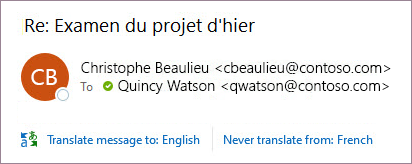
When you receive an email in another language, you can respond in two different ways:
-
In the message, select Translate message. Outlook replaces the message text with translated text.
After you’ve translated the message, you can select Show original to see the message in the original language or Turn on automatic translation to always translate messages to your preferred language.
-
In the message, select Never translate. Outlook won’t ask you if you’d like to translate messages in the future.
If, for some reason, Outlook doesn’t offer these options, select the Translate button from the ribbon, or right-click on the message and select Translate, then Translate Message.
-
On the Home tab, select Translate > Translate Message.
To change your translation preferences, go to Home > Translate > Translation Preferences.
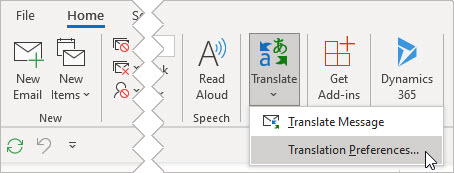
Here you can set your preferred language.
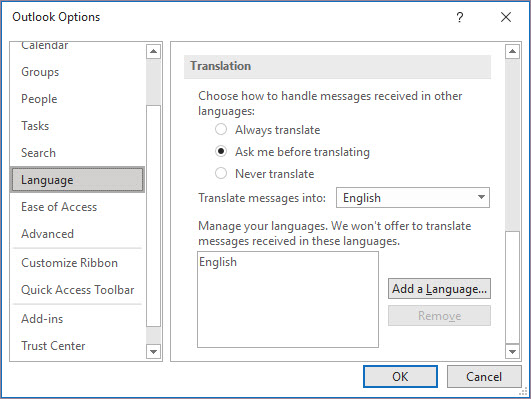
Translate part of an email
To translate just a bit of text from a message, select that text and right-click. Outlook will show you the translation right there in the context menu that appears.

You can also select text and right-click to translate to your preferred language when you’re composing an email. When you click the translated text, you can insert it into the message you’re writing.
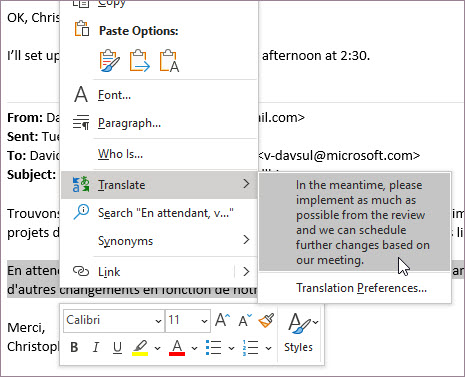
To learn more see Announcing new translation features in Outlook.
Note: Automatic translation and intelligent translation suggestions are only available for Exchange Online mailboxes.
Word for Microsoft 365 makes it easy
In Word for Microsoft 365 when you open a document in a language other than a language you have installed in Word, Word will intelligently offer to translate the document for you. Click the Translate button and a new, machine-translated, copy of the document will be created for you.

Translate words or phrases in Word, Excel, or PowerPoint
-
In your document, spreadsheet or presentation, highlight the cell or text you want to translate.
-
Select Review > Translate.
-
Select your language to see the translation.
-
Select Insert. The translated text will replace the text you highlighted in step 1.
Note: In Excel, there is no Insert button, you’ll have to copy/paste the text you highlighted in step1.
You might see a list of several translations. Expand the translated item to show a usage example in both languages. Choose the one you want and click Copy.
Available in: 

This feature is available to Microsoft 365 subscribers and Office 2019 customers using Version 1710 or higher of Word; or Version 1803 or higher of PowerPoint or Excel. You must also be connected to the internet, and have Office connected experiences enabled to use Translator.
Subscribers get new features and improvements monthly.
Buy or try Microsoft 365
Not sure what version of Office you’re running? See What version of Office am I using?
This feature is not currently available to customers using Microsoft 365 operated by 21Vianet.
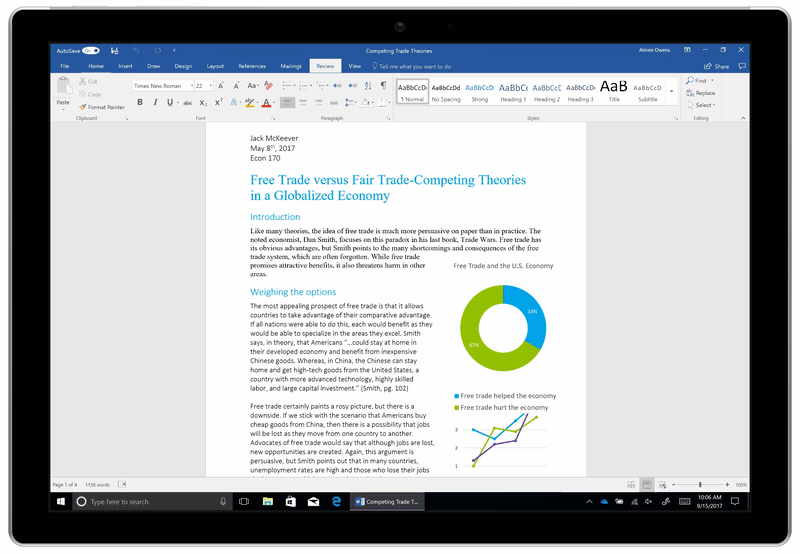
Translate a whole file in Word
-
Select Review > Translate > Translate Document.
-
Select your language to see the translation.
-
Select Translate. A copy of the translated document will be opened in a separate window.
-
Select OK in the original window to close translator.
Available in:
This feature is available to Microsoft 365 subscribers and Office 2019 customers using Version 1710 or higher of Word. You must also be connected to the internet, and have Office connected experiences enabled to use Translator.
Users with Office 2016, but without a subscription, will have the same translation features that are available in Office 2013 and earlier.
Subscribers get new features and improvements monthly.
Not sure what version of Office you’re running? See What version of Office am I using?

Translate words or phrases in OneNote for Windows 10
-
In your notes highlight the text you want to translate.
-
Select View > Translate > Selection.
-
Select your language to see the translation.
-
Select Insert. The translated text will replace the text you highlighted in step 1.
Translate a whole page in OneNote for Windows 10
-
Select View > Translate > Page.
-
Select your language to see the translation.
-
Select Translate. The translated page will be added as a sub-page of the existing page.
-
Select OK in the original window to close translator.
If you later want to change the To language for document translation, or if you need to translate a document to more than one language, you can do so, by selecting Set Document Translation Language…from the Translate menu.

See also
-
Admin considerations for modern translator feature in Office
-
Languages supported by Microsoft Translator
The translation tools available depend on which Office program you’re using:
-
Translate Document/Translate Item: Word, Outlook.
-
Translate Selected Text: Word, Outlook, OneNote, PowerPoint, Publisher, Excel, Visio.
-
Mini Translator: Word, Outlook, PowerPoint, OneNote
You can have an entire Word document or Outlook message translated by a computer («machine translation») and displayed in a web browser. When you choose this kind of translation, the content in your file is sent over the Internet to a service provider.
Note: Machine translation is helpful for conveying the basic subject matter of the content and for confirming whether the content is relevant to you. For high accuracy or sensitive files, human translation is recommended, because machine translation might not preserve the full meaning and tone of the text.
Choose your translation language
-
On the Review tab, in the Language group, click Translate > Choose Translation Language.
-
Under Choose document translation languages click the Translate from and Translate to languages that you want, and then click OK.
Translate the document or message
-
On the Review tab, in the Language group, click Translate.
-
Click Translate Document (Translate Item in Outlook). The From and To languages that you selected are listed.
A browser tab opens with your file in both the original language and the language that you selected for translation.
Note: If this is the first time you have used translation services, you may need to click OK to install the bilingual dictionaries and enable the translation service through the Research pane. You can also see which bilingual dictionaries and machine translation services you have enabled by clicking the Translation options link in the Research pane. See the next section (Translate selected text) to learn how to access the Research pane.
You can use the Research pane to translate a phrase, sentence, or paragraph into several selected language pairs in the following Microsoft Office programs: Excel, OneNote, Outlook, PowerPoint, Publisher, Visio, and Word.
Note: In PowerPoint, only one slide’s text box can be translated at a time.
-
On the Review tab, in the Language group, click Translate > Translate Selected Text to open the Research pane.
Note: In Word, you can right-click anywhere in the document, and then click Translate.
-
In the Research pane, in the All Reference Books list, click Translation.
-
Do one of the following to translate a word or short phrase:
-
Select the words, press ALT, and then click the selection. The results appear in the Research pane under Translation.
-
Type the word or phrase in the Search for box, and then press Enter.
Notes:
-
If this is the first time you have used translation services, click OK to install the bilingual dictionaries and enable the translation service through the Research pane.
-
You can also see which bilingual dictionaries and machine translation services you have enabled by clicking the Translation options link in the Research pane.
-
To change the languages that are used for translation, in the Research pane, under Translation, select the languages that you want to translate from and to. For example, to translate English to French, click English in the From list and French in the To list.
-
To customize which resources are used for translation, click Translation options, and then select the options that you want.
-
-
In Word, Outlook, PowerPoint, and OneNote, the Mini Translator displays the translation of one word as you point at it with your cursor. You can also copy the translated text to the Clipboard, paste it into another document, or play a pronunciation of the translated word.
-
On the Review tab, in the Language group, click Translate > Mini Translator.
-
Point to a word or phrase that you want translated with your mouse. When a faint dialog box appears overlayed in your document, move your mouse over it to see any translations available.
Note: The Mini Translator will continue to appear whenever you move over words. To turn it off, repeat step 1 above.
For more information, see See translations with the Mini Translator.
This feature is only available if you have an Office 365 subscription, or Office 2019 for Mac, and only for Word, Excel, and PowerPoint. For Translator in Outlook see Translator for Outlook for more information.
Translate a whole document
-
Select Review > Translate > Translate Document.
-
Select your language to see the translation.
-
Select Translate. A copy of the translated document will be opened in a separate window.
Available in:
Translate selected text
-
In your document, highlight the text you want to translate.
-
Select Review > Translate > Translate Selection.
-
Select your language to see the translation.
-
Select Insert. The translated text will replace the text you highlighted in step 1.
Note: In Excel, there is no Insert button, you’ll have to copy/paste the text you highlighted in step1.
Available in:
Translate a whole document
Word for the web makes it easy to translate an entire document. When you open a document that is in a language other than your default language, Word for the web will automatically offer to create a machine-translated copy for you.
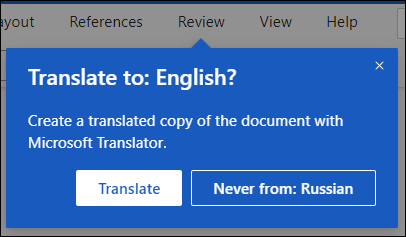
If you’d prefer to initiate the translation manually, you can still do that with these steps:
-
Select Review > Translate > Translate Document.
-
Select your language to see the translation.
-
Select Translate. A copy of the translated document will be opened in a separate window.
Available in:
Translate selected text
-
In your document, highlight the text you want to translate.
-
Select Review > Translate > Translate Selection.
-
Select your language to see the translation.
-
Select Insert. The translated text will replace the text you highlighted in step 1.
Available in:
Translate an email
-
When you receive an email in another language, a prompt will appear at the top of the message asking if you’d like Outlook to translate it into your default language.
-
If you select Translate message, Outlook will replace the message text with translated text.
You can then select Show original message to see the message in the original language or Turn on automatic translation to always translate messages in another language.
-
If you select Never translate, Outlook won’t ask you if you’d like to translate messages in that language in the future.
-
You can change your translation preferences and choose your translation language by going to Settings
> View all Outlook settings > Mail > Message handling.
Available in:
More information
-
Microsoft Translator languages
-
Right-to-left languages
-
Language Accessory Pack for Office
-
Change the language Office uses in its menus and proofing tools
-
Enable or change the keyboard layout language
-
Check spelling and grammar in a different language



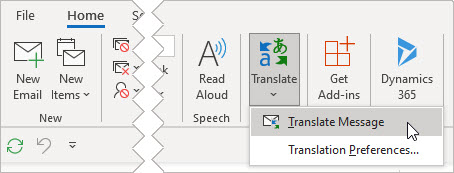



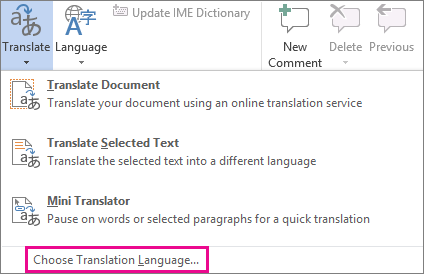
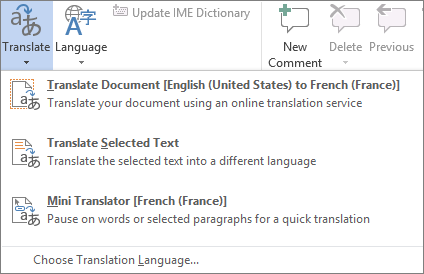
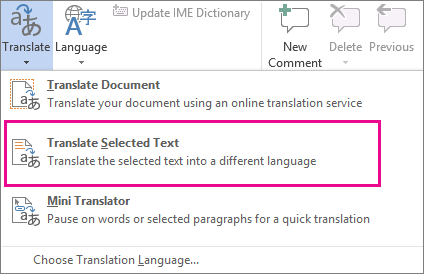

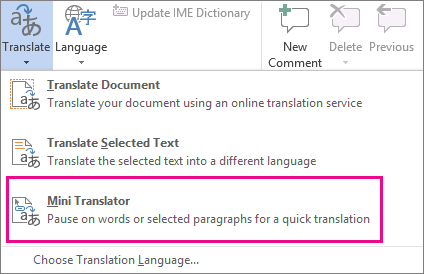
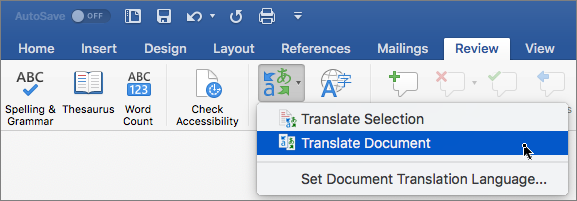
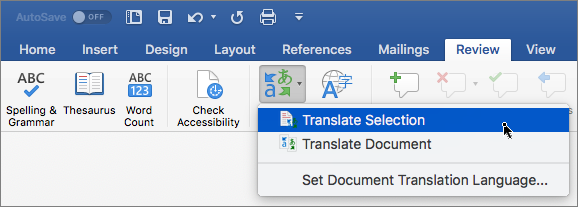

 > View all Outlook settings > Mail > Message handling.
> View all Outlook settings > Mail > Message handling.